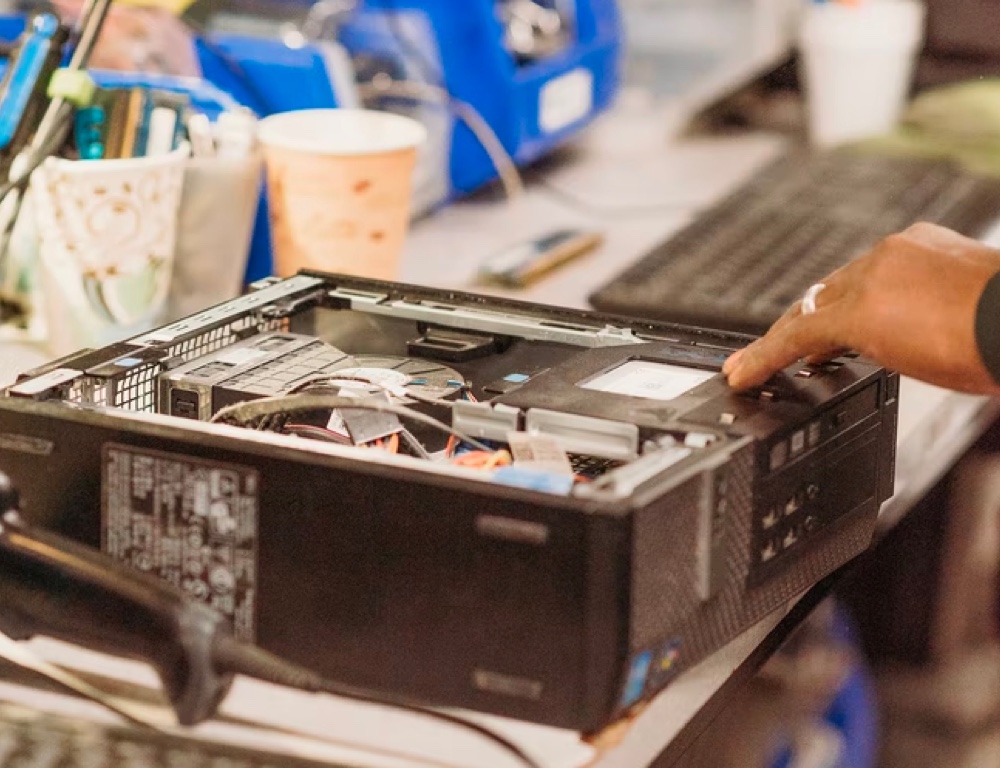
What is WEEE recycling and why is it important?
As a Managed Technology company dealing with all sorts of hardware and data, we make it our mission to recycle and dispose of these items in the most efficient and correct manner.
What is WEEE?
WEEE recycling stands for Waste and Electrical and Electronic Equipment recycling.
It’s a blanket term for electrical equipment that is no longer required. It covers equipment powered via a plug or battery. It also includes components used to make electrical equipment.
The crossed-out wheelie bin logo appears on any electrical or electronic equipment produced after 13th August 2005. The logo identifies the product as WEEE and so should not be put in a general waste bin. Instead, they should be disposed of via a licensed waste management company.
There are currently 10 categories of WEEE:
- Large household appliances
- Electrical and Electronic tools
- Toys, leisure and sports equipment
- Medical devices
- Monitoring and control equipment
- Automatic dispensers
- Small household appliances
- IT and telecommunications equipment
- Lighting equipment
Weee electrical waste is a growing problem despite efforts being made by producer compliance schemes to reduce it. For instance, a weee producer compliance scheme provides consumers with proper collection and disposal services to take weee, waste electrical appliances ,off their hands in an eco-friendly way. This has been instrumental in keeping weee out of landfill sites where it can leak toxic substances into the environment. It’s clear we need more initiatives like these to ensure we remain conscious of our weee habits and the impact they have on our planet.
What does WEEE Stand for?
Have you ever heard someone talk about WEEE and wondered what it stands for? Well, WEEE stands for Waste Electrical and Electronic Equipment. This acronym refers to the collection, processing, and recycling of devices that have been discarded by the users – old computers, cell phones, tablets, television sets etc.
Explain WEEE Regulations and the WEEE Directive
Weee, or Waste Electrical and Electronic Equipment, is regulated by the weee directive in the European Union and many other countries. This law dictates that all electrical and electronic waste must be collected, recycled, and disposed of in a responsible manner. The weee directive sets forth certain categories from which weee must be broken down into such as temperature exchange equipment, lighting equipment, monitoring and control instruments, electric motors and electronic board assemblies. These specific categories help identify what can be done with weee during safe disposal. The weee directive helps reduce the amount of weee that goes to landfills without proper recycling efforts by formally identifying weee categories. By understanding weee regulations more efficiently, we can work together towards being a sustainable society.
The WEEE Law and UK WEEE Regulations:
Up until February 2003, there were no laws or regulations regarding the recycling of electronic equipment and devices. Once WEEE became law, eletcronics started to carry the crossed-out bin symbol, to indicate the correct way to dispose of electronics.
Any WEEE items can be classified as such if they have reached the end of their use life, whether it is a household item or non-household item.
Why is WEEE so important?
All electrical waste contains chemicals that are harmful to the environment. When WEEE is simply dumped in landfills, over time the products decay and leak toxins into the earth and our waste systems. This can lead to the toxins entering our food chain and ultimately, into us.
What should be recycled under WEEE?
There are a number of different types of electronic items that fall under the WEEE umbrella. Most household appliances fall under this, as well as toys, medical devices, consumer equipment and monitoring/control equipment.
When it comes to the majority of businesses, there are a few key items that are regularly disposed of or replaced. The most popular electrical equipment in businesses being the following:
- Computers – Either desktop or laptop
- Telephones – Including conference phones, mobile phones and other landline units
- Monitors
- Printers and Scanners
- Keyboards and Mice
- Routers
